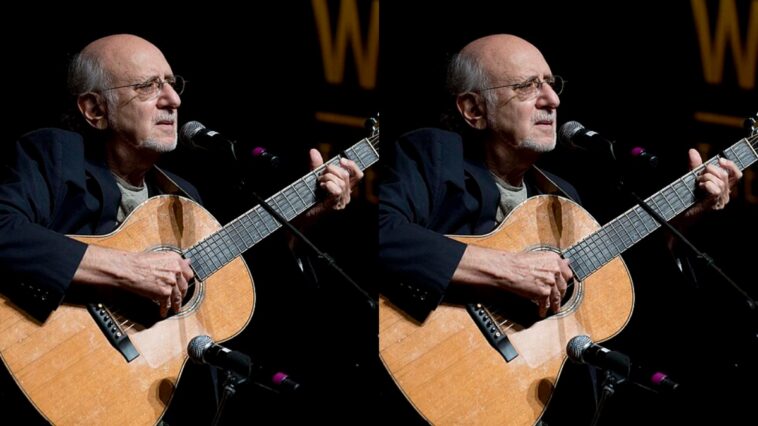Peter Yarrow, the iconic singer-songwriter best known as a member of the legendary folk trio Peter, Paul and Mary, passed away on January 7, 2025, at the age of 86. A towering figure in American folk music, Yarrow’s contributions spanned decades, blending harmonious melodies with a commitment to social justice. His death, attributed to bladder cancer, marks the end of an era. This article reflects on his illustrious career, his legacy as a civil rights activist, and the formative influence of his parents.
A Musical Journey Begins
Born on May 31, 1938, in Manhattan, New York, Peter Yarrow’s childhood was steeped in cultural and intellectual richness. His parents, Bernard and Vera Yarrow, were Ukrainian Jewish immigrants whose dedication to education and community left a profound impact on their son. Growing up in a household that valued academic excellence and social responsibility, Yarrow found himself drawn to the arts at an early age.
Yarrow attended the High School of Music and Art in New York City, where he honed his talents in painting and developed a deep love for music. Summers spent at Interlochen Arts Camp in Michigan further enriched his artistic foundation. Though he initially pursued a degree in physics at Cornell University, his passion for understanding human nature led him to switch to psychology. He graduated in 1959, armed with an education that would influence the depth and empathy of his future songwriting.
Peter Yarrow’s Parents
Yarrow’s upbringing was profoundly shaped by his parents, Bernard Yarrow and Vera Burtakoff (later Wisebrode). Bernard was a respected attorney who served as an assistant district attorney under Thomas E. Dewey. Later, he became a senior vice president of Radio Free Europe, a role that exemplified his commitment to freedom of expression and combating authoritarianism. Vera, an educator specializing in speech and drama, taught at New York’s Julia Richman Education Complex. Her work reflected a belief in the transformative power of the arts, a value she passed on to her son.
The family dynamic shifted when Peter was five years old. His parents divorced in 1943, and his mother later remarried Harold Wisebrode, who served as executive director of Central Synagogue in Manhattan. Bernard’s conversion to Protestantism after the divorce introduced complexities into Peter’s life but also exposed him to a diverse range of cultural and religious perspectives. These influences would later resonate in his music and activism.
The Rise of Peter, Paul and Mary
Following his graduation, Yarrow became a central figure in the Greenwich Village folk scene, a vibrant hub for budding artists and activists in the early 1960s. It was there that he met Noel Paul Stookey and Mary Travers, leading to the formation of Peter, Paul and Mary in 1961. Managed by Albert Grossman, the group quickly gained acclaim for their harmonious vocals and poignant lyrics.
The trio’s self-titled debut album in 1962 catapulted them to fame, featuring songs like “If I Had a Hammer” and “Lemon Tree.” Their rendition of Bob Dylan’s “Blowin’ in the Wind” became an anthem of the civil rights movement, embodying the spirit of change that defined the era. Yarrow’s songwriting skills shone with hits like “Puff, the Magic Dragon,” which continues to captivate audiences with its evocative storytelling.
Music as a Catalyst for Change
Peter, Paul and Mary were more than a folk group; they were the voice of a generation striving for justice and equality. The trio performed at the 1963 March on Washington, where Dr. Martin Luther King Jr. delivered his historic “I Have a Dream” speech. Their music became a rallying cry for the civil rights movement, the anti-war movement, and countless other causes.
Yarrow’s activism extended beyond the stage. In 1969, he produced the “Survivors of the Holocaust” concert at Madison Square Garden, an event that raised awareness of genocide and celebrated the resilience of survivors. Decades later, he co-founded Operation Respect, an organization dedicated to combating bullying and creating inclusive environments for children.
Personal Life and Controversies
In 1969, Yarrow married Mary Beth McCarthy, niece of Senator Eugene McCarthy. The couple had two children, Bethany and Christopher, before divorcing in 1981. His daughter Bethany Yarrow became a singer and activist, continuing her father’s legacy of blending art with advocacy.
Yarrow’s life was not without controversy. In 1970, he was convicted of taking indecent liberties with a 14-year-old girl, a crime for which he served three months in prison. President Jimmy Carter later pardoned him in 1981, but the incident remained a blemish on his otherwise storied career. Despite this, Yarrow worked tirelessly to promote causes he believed in, channeling his experiences into empathy-driven activism.
Peter Yarrow’s Parents: A Lifelong Influence
Yarrow’s parents continued to influence his personal and professional life long after his childhood. Bernard’s dedication to democracy and Vera’s passion for education were evident in Peter’s career choices and his commitment to using music as a force for good. The values they instilled in him laid the foundation for his activism, shaping his belief in the power of the arts to inspire change.
Bernard’s work with Radio Free Europe symbolized the fight against oppression, a cause Yarrow took up with fervor. Vera’s teaching career highlighted the importance of nurturing creativity and self-expression in young people, a principle that Yarrow championed through Operation Respect.
Legacy and Lasting Impact
Peter Yarrow’s passing marks the end of a remarkable chapter in American music and activism. Through Peter, Paul and Mary, he gave voice to the dreams and struggles of a generation, providing a soundtrack for social change. His dedication to civil rights, peace, and education is a testament to his enduring belief in the potential of humanity to rise above division and hate.
Songs like “Blowin’ in the Wind” and “Puff, the Magic Dragon” continue to resonate, offering hope and inspiration to audiences around the world. As Bethany Yarrow observed, her father’s unwavering faith in music as a tool for justice will remain his most enduring legacy.
Conclusion
Peter Yarrow’s journey, shaped by the lessons of his parents and his experiences as an artist and activist, is a story of resilience, compassion, and the transformative power of creativity. His music bridged divides, inspiring people to dream of a better world and work toward achieving it. In his passing, we remember a man who not only sang for change but lived it.



